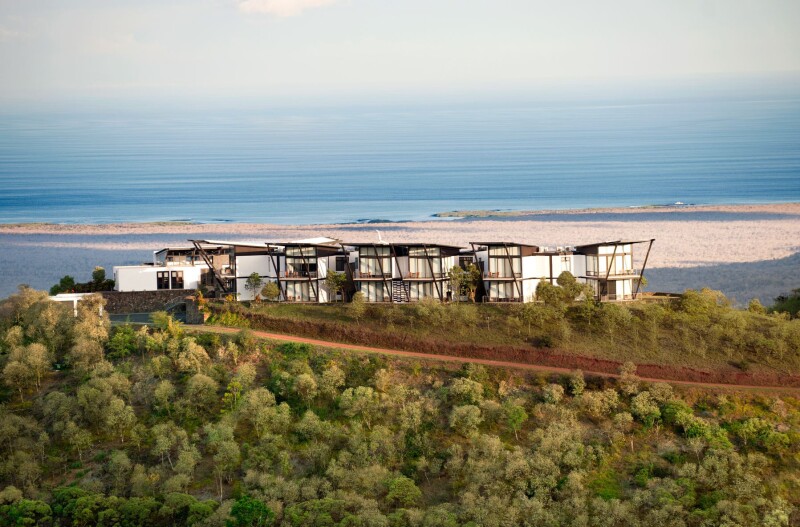Around the world, hotels and resorts are adopting ecofriendly and socially responsible practices. They include a safari camp in Kenya that’s owned and operated by the indigenous Samburu people, which means profits go directly back to locals; a resort in Fiji that organically grows a whopping 80 percent of all the produce in all its restaurants; and hotels that have done away with plastic bottles entirely. Here are six ways hotels are becoming more sustainable for the environment while also giving back to their communities.

At Sarara Camp, all profits are funneled into community and wildlife protection initiatives.
Courtesy of Sarara Camp/Facebook
Local ownership
Sarara Camp in northern Kenya is operated by the local, seminomadic Samburu people, and all profits are funneled into community and wildlife protection initiatives. In Northern Australia’s remote Nitmiluk National Park, the indigenous Jawoyn people own Cicada Lodge, which offers travelers an immersive encounter with a landscape the Jawoyn have inhabited for thousands of years.

Due to the restoration efforts at Pikaia Lodge in the Galápagos Islands, giant tortoises and native birds have returned to the area.
Courtesy of Pikaia Lodge Galapagos
Sustainable architecture
Pikaia Lodge, located on Santa Cruz Island in Ecuador’s fragile and biodiverse Galápagos Islands, was constructed with natural and recyclable materials and outfitted with ethically cultivated Ecuadoran teakwood furnishings. Pikaia sits on a former cattle ranch and has restored endemic trees and vegetation on its land; as a result, giant tortoises and native birds have returned to the area.

Six Senses Fiji uses Tesla batteries and solar panels, which make the resort completely solar powered.
Courtesy of Six Senses Fiji/Amber Toms
Energy efficiency
Seventeen camps owned by Wilderness Safaris in sub-Saharan Africa are 100 percent solar powered, including the lodge company’s iconic Mombo Camp, located in Botswana’s Okavango Delta. Six Senses Fiji, with its 24 private pool villas in the South Pacific, is designed to be completely solar powered, thanks to Tesla batteries and solar panels lining the roofs of residences and resort facilities.
The Brando in French Polynesia runs on a mix of solar power and coconut biofuel. The resort also has technology that harnesses cold deep-ocean water for air-conditioning, which cuts energy use by 70 percent.

A 240-acre farm located on the Laucala Island Resort property provides 80 percent of all produce consumed at the resort.
Courtesy of Luacala Island Resort Fiji
Sustainable food sources
Laucala Island Resort in Fiji has a 240-acre farm that organically grows 80 percent of all the produce consumed at the resort—no small feat for a remote private island. Shangri-La Hotels and Resorts, meanwhile, is offering sustainably sourced seafood, as certified by the Marine Stewardship Council, on the menus at 53 of its properties in China and Hong Kong, whose populations are the world’s largest consumers of seafood.

Singita operates two cooking schools, one in Tanzania and one in South Africa.
Courtesy of Singita
Community opportunities
Singita, which runs 12 camps and lodges in Africa, operates two cooking schools, one in Tanzania and one in South Africa, that offer a yearlong, internationally accredited, tuition-free culinary course for locals chosen by a rigorous application process. Some graduates are recruited into Singita kitchens, while others are hired by different local lodges. At Fogo Island Inn, in Newfoundland, Canada, all operating surpluses support community initiatives, such as microlending projects supporting local businesses that otherwise might not survive, such as farmers who supply food to the restaurant.

Every room at 1 Hotel Brooklyn Bridge includes a filtered-water system.
Courtesy of 1 Hotel Brooklyn Bridge
Water conservation
With 10 properties across the United States, Even Hotels is one of an increasing number of hotel chains that offer filtered water stations throughout the premises, along with free reusable water bottles. In New York City, 1 Hotel Brooklyn Bridge takes the concept a step further, installing a system to supply filtered water in every room, along with five-minute timers next to the shower, for guests who want to minimize their water usage. A rooftop water-capture system helps to irrigate Brooklyn Bridge Park next door.
For more on ethical travel, check out the To the Best of Our Knowledge podcast episode, inspired by AFAR’s May/June hospitality issue.








